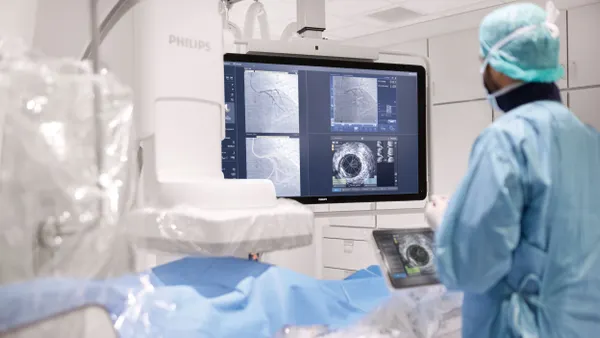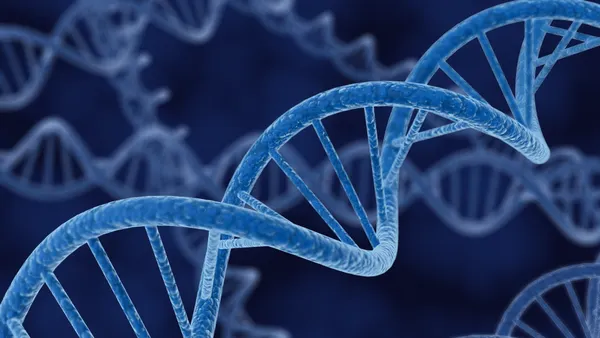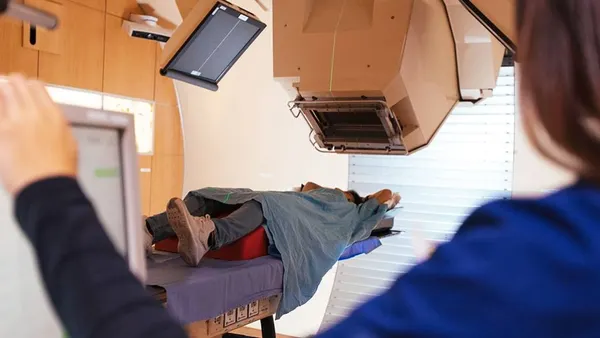Dive Brief:
- FDA Friday cleared a targeted bladder cancer drug developed by Johnson & Johnson, marking the first time advanced patients with the tumor type have access to an approved therapy matched to a specific genetic mutation.
- J&J's drug — called Balversa — is OK'd to treat patients with metastatic or locally advanced bladder cancer whose tumors harbor alterations in a gene known as FGFR. Balversa is also the first FGFR inhibitor, regardless of cancer type, to reach market in the U.S.
- In addition to Balversa, the FDA co-approved a companion diagnostic from Qiagen designed to test FGFR alterations.
Dive Insight:
The pharma and medtech is set to share first quarter results Tuesday morning. J&J posted $6.67 billion in medical device revenue last quarter and has since closed a $3.4 billion acquisition of robotic surgery system manufacturer Auris Health and divested its Advanced Sterilization Products business for $2.8 billion.
Balversa (erdafinitib) is J&J's second drug approval this year, following the FDA's closely watched decision on Spravato (esketamine) in March. J&J has high expectations for both, predicting peak annual sales of more than $1 billion.
Balversa should also help to reinforce an oncology franchise that could soon be hit by generic competition to J&J's top-selling Zytiga (abiraterone acetate).
Friday's approval from the FDA is based on early results from just 87 patients, and therefore contingent on further study. Specifically, Balversa is OK'd for adult bladder cancer patients whose tumors continued to grow following treatment with chemotherapy and who have alterations in either the FGFR2 or FGFR3 gene.
Among those 87, treatment with Balversa helped to shrink tumors in 28, two of whom experienced a complete response.
Treatment was associated with significant side effects, including the risk of serious eye problems like inflamed cornea and retina disorders. The FDA recommends patients have intermittent eye examinations.
Balversa will be available in the U.S. within the next week, and will carry a list price between $10,080 and $22,680 per 28-day supply, depending on the dosage used.
A company spokesperson noted the anticipated average cost per patient will be $18,400 and that Balversa's price is "generally comparable to other oral oncology medicines."
By clearing Balversa, the FDA extends the reach of targeted therapy approaches — common in lung and breast cancers — into bladder cancer.
"We're in an era of more personalized or precision medicine, and the ability to target cancer treatment to a patient's specific genetic mutation or biomarker is becoming the standard, with advances being made in new disease types," said Richard Pazdur, director of the FDA's Oncology Center of Excellence, in a Friday statement.
That's permitted faster cancer drug approvals with less supporting data, although as Balversa shows such results don't always need to be transformative to garner a conditional OK.
Fuller data presented last year at the annual meeting of the American Society of Clinical Oncology showed Balversa led to a 37% partial response rate and 3% complete response among 99 patients. Those figures were per investigator assessments, while the data cited by the FDA in its approval come from a blinded independent review committee, a spokesperson for J&J's Janssen subsidiary confirmed.
Per that ASCO data, median overall survival reached 13.8 months, with a median progression-free survival of five and a half months.
A Phase 3 study testing Balversa against chemotherapy or Keytruda (pembrolizumab) is currently enrolling, with a target completion date of November 2020.
By then, Balversa may have company, at least as FGFR inhibitors go. Incyte is developing pemigatinib, an anti-FGFR 1/2/3 therapy, in bile duct cancer as well as bladder. A submission for approval in the former tumor type is set for the second half of this year, with a supplemental filing to follow next year if all goes to plan.
Also in bladder cancer, Seattle Genetics recently posted positive Phase 2 data for its antibody-drug conjugate enfortumab vedotin in previously treated patients with metastatic disease. (The drug targets nectin-4, rather than FGFR).
Bladder cancer, which includes urothelial carcinoma, is the sixth most common cancer type in the U.S. According to the FDA, FGFR alterations are present in approximately 20% of patients with recurrent or refractory disease. J&J cites data indicating as many as 3,000 people with urothelial carcinoma will test FGFR positive each year.












